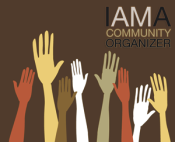I suspect that the opponents of Net Neutrality have set up a list of astroturf fake minority groups, because I'm not familiar with ANY of the supposed minority groups on the list. And the groups I am familiar with do not have their names on the list, with the exception of one signature from the NAACP. The opponents of Net Neutrality apparently hope that the public and Congress will see words like "Latino" and believe that Latinos oppose Net Neutrality, when in fact the group was created by the Neutrality opponents exclusively for the purpose using the group name against Net Neutrality.
A little bit of research into the groups on the list will tell whether there are any cases in which this was true. In any case, I don't see on this list the names of any REAL groups that I would recognize as legitimate groups representing these minorities. I could be wrong. Look at the LIST. If any of these groups are real, then they need to be challenged by their constituents.
"[S]everal Congressional Black Caucus members were among 72 Democrats to write the FCC last fall questioning the need for Net Neutrality rules"? Each of them should explain their position, so we can evaluate the effect their stand should have on their political futures.
"We [Color of Change] just posted this at JackandJillPolitics, Daily Kos, HuffPo, FireDogLake, and OpenLeft."
From: William Winters
ColorOfChange.org
It’s said that politics creates strange bedfellows. I was reminded how true this can be when I traveled to D.C. in recent weeks to figure out why several advocacy groups and legislators with histories of advocating for minority interests are lining up with big telecom companies in opposition to the FCC’s efforts to pass “Net Neutrality” rules.
Net Neutrality is the principle that prevents Internet Service Providers from controlling what kind of content or applications you can access online. It sounds wonky, but for Black and other communities, an open Internet offers a transformative opportunity to truly control our own voice and image, while reaching the largest number of people possible. This dynamic is one major reason why Barack Obama was elected president and why organizations like ColorOfChange.org exist.
So I was troubled to learn that several Congressional Black Caucus members were among 72 Democrats to write the FCC last fall questioning the need for Net Neutrality rules. I was further troubled that a number of our nation’s leading civil rights groups had also taken positions questioning or against Net Neutrality, using arguments that were in step with those of the big phone and cable companies like AT&T and Comcast, which are determined to water down any new FCC rules.
Most unsettling about their position is the argument that maintaining Net Neutrality could widen the digital divide.
First, let’s be clear: the problem of the broadband digital divide is real. Already, getting a job, accessing services, managing one’s medical care—just to mention a few examples—are all facilitated online. Those who aren’t connected face a huge disadvantage in so many aspects of our society. Broadband access is a big problem — but that doesn’t mean it has anything to do with Net Neutrality.
Yet some in the civil rights community will tell you differently. They claim that if broadband providers can earn greater profits by charging content providers for access to the Internet “fast lane,” then they will lower prices to underserved areas. In other words, if Comcast — which already earns 80 percent profit margins on its broadband services — can increase its profits under a system without Net Neutrality, then they’ll all of a sudden invest in our communities. You don’t have to be a historian or economist to know that this type of trickle-down economics never works and has always failed communities of color.
Whether the phone and cable companies can make more money by acting as toll-takers on the Internet has nothing to do with whether they will invest in increased deployment of broadband. If these companies think investing in low-income communities makes good business sense, they will make the investment. Benevolence doesn’t factor into the equation.
On my trips to Washington, I met with some of the groups and congressional offices questioning or opposing Net Neutrality. I asked them what evidence they had to back up claims that undermining Net Neutrality would lead to an expansion of broadband to under-served communities, or that preserving Net Neutrality would thwart expansion. Not one could answer my question. Some CBC members hadn’t yet been presented with a counter to the industry’s arguments; others told stories about pressure from telecom companies or from other members of congress. As one CBC staffer told me, many CBC members have willingly supported the business agenda of telecom companies because the industry can be counted on to make campaign contributions, and they face no political backlash.
I also heard from people who don’t consider themselves against Net Neutrality, but who say their issue is prioritizing broadband expansion over maintaining Net Neutrality—as if the two have some intrinsic competitive relationship. When I’ve asked about the relationship, again, no one could provide anything concrete.
To those taking positions against Net Neutrality, I ask what sense it makes to undermine the very power of the Internet, especially for our communities, in order to provide access to everyone, presuming for a second the two were even connected. It’s like what we have with cable — our communities are saturated with programming that they cannot control, with no benefit of empowerment for anyone. Again, no one with whom I talked had an answer to this point.
Thankfully, there are an array of grassroots, media and social justice organizations that have not followed this line of reasoning and are actively supporting Network Neutrality, such as the Center for Media Justice and the Applied Research Center. Black and brown journalists and media groups who understand the need for unconstrained expression on the part of our communities are on the same page as well: the National Association of Hispanic Journalists, UNITY: Journalists of Color, the National Association of Latino Independent Producers, the National Association of Black Journalists, and the National Hispanic Media Coalition have all been vocal supporters of Net Neutrality.
Prominent lawmakers, including CBC members Reps. John Conyers, Maxine Waters, and Donna Edwards are vocal supporters, as are House Speaker Nancy Pelosi and President Obama — who has pledged to “take a back seat to no one” on the issue. And last week, Mignon Clyburn, a commissioner at the FCC, called out advocacy groups entrusted by many to represent our communities, for making half-baked arguments that completely miss the boat on the importance of Net Neutrality to our communities.
As Clyburn pointed out, far from being just a concern of the digital elite, Net Neutrality is essential to what makes the Internet a place where people of color and marginalized communities can speak for ourselves without first asking for permission from gatekeepers, and where small blogs, businesses, and organizations operate on a level playing field with the largest corporations. Net Neutrality regulations are needed to protect the status quo, because the telecom industry sees an opportunity for profit in fundamentally altering this basic aspect of the Internet.
In the coming weeks I plan to head back to DC to continue to fight for Net Neutrality. I’m hoping that on my next trip some of the anti-Net Neutrality civil rights groups or CBC members will heed my call and explain their position. I would like to believe that there is more to the “civil rights” opposition to Net Neutrality than money, politics, relationships, or just plain lack of understanding. For now, I’m doing my best to keep an open mind. But I don’t think it will stay that way for much longer.


